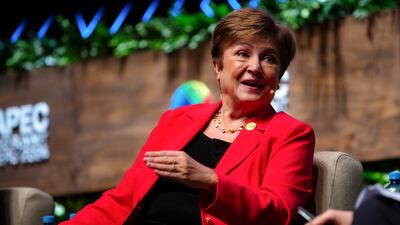The International Monetary Fund on Wednesday said its staff and Egyptian authorities have made “substantial progress on policy discussions” at the end of the lender's visit to Cairo.
“Discussions will continue over the coming days to finalise agreement on the remaining policies and reforms that could support the completion of the fourth review,” the IMF said in a statement on the review of the extended fund facility.
Wednesday's statement came two weeks after IMF managing director Kristalina Georgieva's visit to Cairo, where she urged the country to continue implementing reforms agreed to as part of an $8 billion loan programme.
“Reforms are not easy,” Ms Georgieva said at the time, adding that she remained confident the country would see the benefits of the changes.
This largely echoed remarks she made during the IMF and World Bank spring meetings in Washington last month, where she said delaying reforms “ultimately falls on the shoulders of people”.
Meanwhile, Egyptian authorities have been considering re-evaluating the terms of the deal due to regional challenges and the strain that Cairo says the reforms are putting on its people. Earlier on Wednesday, Egyptian Prime Minister Mostafa Madbouly said Cairo has asked the IMF to review the objectives for the full duration of the loan programme, Reuters reported.
The IMF noted the challenges Egypt is facing most notably the spillover effects from the Gaza war and trade disruptions in the Red Sea, where revenue has fallen by 70 per cent.
“With continuing multiple geopolitical tensions in the region, the economic outlook for the region including Egypt remains challenging,” the IMF said.
The Washington-based multilateral lender also said an influx of refugees is adding to fiscal pressures on health, education and other public services. But Ms Georgieva said she did not believe the current strains were large enough to change the IMF's reforms.
The IMF's mission to Cairo broadly echoed that sentiment. The IMF noted progress Egypt's central bank has made on inflation, which has fallen from a 37 per cent peak last year to its current 26.5 per cent level, according to government data.
The IMF noted progress in inflation “has been temporarily restrained by increases in administrative prices". It also noted the need to strengthen the social safety net to help vulnerable groups from the high cost of living and increases in energy costs.
Unifying the exchange rate has helped to eliminate the backlog of foreign exchange demand and ease imports, the IMF said. The Central Bank of Egypt remained committed to a flexible exchange rate regime.
“Going forward, the focus needs to remain on ensuring inflation is on a firm downwards trend towards the medium-term target," the IMF said.
It projects headline inflation to fall near 16 per cent by the end of the 2024-25 fiscal year, according to its Regional Economic Outlook.
“At the same time, as agreed with the authorities, further efforts will be needed to mobilise domestic revenue, contain fiscal risks [especially those stemming from the energy sector], and expand the social safety net.
The IMF said it welcomes Egypt's plans to enable trade, streamline the tax system and improve customs procedures. It encouraged Cairo officials to speed up their divestment plans and ensure a level playing field.
“Promoting private-sector development as the main engine of future growth is key to ensure sustained macroeconomic stability, create jobs and unlock Egypt’s economic potential for the benefit of all Egyptians,” the IMF said.


